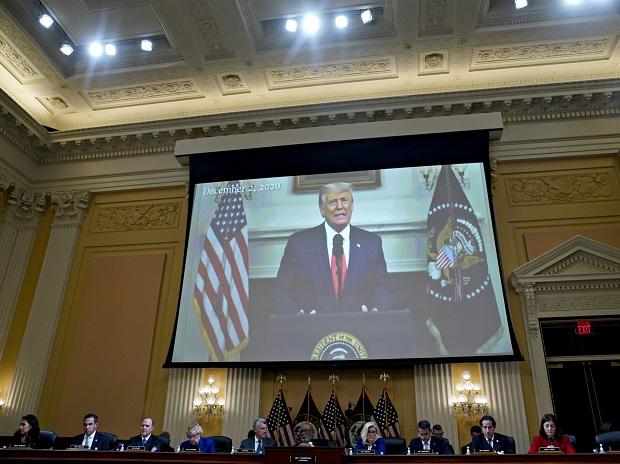[ad_1]
A House committee investigating the Capitol insurrection said Congress should consider whether to bar former President Donald Trump and others tied to the Jan. 6 attack from public office, one of nearly a dozen recommendations aimed at preventing future attempts to overturn a US election.
In its final report issued Thursday, the committee called for assessing whether anyone — possibly including Trump — who took an oath of public office and later stoked the insurrection should be disqualified from future government service under the 14th Amendment of the Constitution. It also recommended closing loopholes in the congressional count of presidential electors, while also strengthening oversight and training of the Capitol Police.
ALSO READ: US House Jan 6 panel recommends steps to safeguard electoral integrity
Yet with Republicans preparing to take control of the House next month following the November midterm election, most of the proposals in the panel’s 814-page report are considered dead on arrival. The committee of seven Democrats and two Republicans is set to disband as the new Congress is seated in January.
House GOP leader Kevin McCarthy, currently running for Speaker, is unlikely to follow up on the panel’s recommendations and has signaled that he would potentially even investigate the Jan. 6 committee itself, so most of the proposals would have to wait until Democrats retake the majority in the lower chamber.
In contrast to the detailed sections on the actions taken by Trump and others, the four-pages of recommendations are broad and thinly sketched out, and only one of the proposals has found any traction.
ALSO READ: House Jan 6 comittee releases report blasting Trump for Capitol assault
Just hours before the report was posted, the Senate voted to update the Electoral Count Act of 1887, creating a fast-track legal process if a state refuses to certify the results. The measure also clarifies that the vice president has no authority to throw out electors — as Trump pressured Mike Pence to do — and raises the number of lawmakers required to vote on an objection to electors.
The legislation, backed by lawmakers from both parties, was included in must-pass government spending legislation passed by the Senate earlier Thursday and awaiting House passage on Friday. The Senate changes did not go as far as a bill that passed the House in September, co-sponsored by Jan. 6 committee Vice Chair Liz Cheney, but voting rights groups have said it addresses their main concerns.
The report also calls for lawyers who worked on some parts of Trump’s efforts to overturn his loss to face disciplinary action from their state bars, which is already happening in some cases. The committee additionally recommended that the joint session of Congress when electors are counted be designated as a “special security” event requiring extra attention, on par with the inauguration or a State of the Union address.
Noting that Trump allies considered using the Insurrection Act as part of their bid to overturn the election, the report said that Congress should “consider risks posed for future elections,” though the panel stopped short of making a specific recommendation.
The committee also called on Congress to stiffen federal criminal penalties for making threats against election workers and expanding protection of their personal information. Part of the report chronicles harassment in 2020 of election officials and politicians in battleground states, some of whom were specifically targeted by Trump and his allies.
The report recounted the emotional testimony from former Georgia election workers Ruby Freeman and Shaye Moss and listed numerous other examples of death threats and racist, antisemitic, and sexualized attacks on other people across the country.
“Driven by our investigative findings, these recommendations will help strengthen the guardrails of our democracy,” Representative Bennie Thompson, a Mississippi Democrat who chaired the panel, wrote in a foreword to the report.
(Updates with recommendation on barring Trump from holding office starting in first paragraph)
–With assistance from Zoe Tillman.
[ad_2]
Source link



